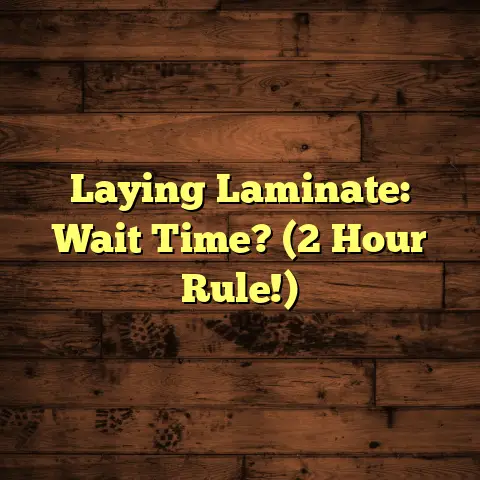Do Office Chairs Ruin Hardwood? (1 Costly Mistake!)
Have you ever cringed at the sound of your office
chair rolling across your beautiful hardwood floors?
Or worse, noticed unsightly scratches and dents
appearing after moving your chair around?
I’ve seen it happen countless times as a flooring
contractor.
It’s a common problem, and honestly,
it’s a real heartbreaker to witness.
Let’s dive into why this happens and, more importantly, how to prevent it!
Section 1: Understanding Hardwood Flooring
Overview of Hardwood Flooring
Hardwood flooring.
It’s the classic choice,
right?
Think oak, maple, cherry, walnut – the list goes
on.
These are all solid wood planks milled from a
single piece of timber.
Then there’s engineered hardwood, which has a thin layer of real hardwood on top of a plywood or fiberboard core.
People love hardwood for its warmth, timeless
look, and the way it can increase a home’s value.
It’s also pretty durable, which is why it’s so popular
in both homes and offices.
Common Misconceptions About
Hardwood Durability
Now, here’s where things get interesting.
A lot of people think hardwood is indestructible.
I wish that were true!
While it’s definitely a durable
option, it’s not invincible.
Several factors can contribute to wear and tear. Things like:
- Foot traffic: The more people walking on it, the faster it wears down.
- Pets: Claws can scratch the surface, and accidents can damage the finish.
- Furniture: Dragging furniture across the floor is a big no-no!
- Moisture: Spills and humidity can cause warping and damage.
And yes, you guessed it, office chairs play a significant role, especially in high-traffic areas.
Section 2: The Role of Office Chairs
in Hardwood Damage
Types of Office Chairs and Their Features
Think about all the different office chairs out there.
You’ve got your basic task chairs, ergonomic chairs
designed for comfort, executive chairs with all the
bells and whistles, and even gaming chairs.
They come in all shapes and sizes, and their weight
can vary quite a bit.
A lightweight task chair might
weigh around 20 pounds, while a heavy-duty
executive chair could easily be 50 pounds or more.
And then there are the wheels.
The wheel material
is critical!
You’ll find plastic, rubber, metal, and
even polyurethane options.
These materials interact differently with your hardwood floors.
How Office Chairs Cause Damage
So, how exactly do these chairs wreak havoc on
your floors?
Here are the main culprits:
- Scratching: Hard plastic or metal wheels can easily scratch the finish of your hardwood floors.
- Denting: Heavy chairs, especially those with small, hard wheels, can dent the wood, especially softer wood types.
- Finish Wear: Constant rolling back and forth can wear down the finish over time, leaving your floors looking dull and faded.
The weight of the chair and the type of wheels
are the biggest factors.
A heavy chair with hard
plastic wheels is a recipe for disaster.
Imagine the pressure being exerted on a small area of your floor with every roll!
Section 3: Real-Life Impacts of
Office Chairs on Hardwood Flooring
Case Studies of Damaged
Hardwood Floors
I’ve seen some pretty heartbreaking cases over the years. Let me share a couple:
- The Scratched Office: I once worked with a small business owner who had just installed beautiful new oak floors in their office.
Within a few months, they were covered in scratches from their office chairs.
They had used standard plastic wheels, and the damage was extensive. - The Dented Den: A homeowner contacted me about their den, which had gorgeous cherry hardwood.
Their heavy executive chair had left deep dents in the floor, especially around the desk area.
Refinishing was the only option.
These are just a couple of examples, but they highlight how easily office chairs can damage hardwood floors.
Economic Consequences of Damage
Now, let’s talk money. Repairing or refinishing hardwood floors can be expensive.
- Spot Repair: Fixing a few scratches or dents might cost a few hundred dollars.
- Refinishing: Refinishing an entire room can easily run into the thousands, depending on the size and the type of wood.
- Replacement: If the damage is severe, you might have to replace the entire floor, which is the most expensive option.
Beyond the immediate repair costs, damaged
flooring can also decrease your property value.
Potential buyers will notice damaged floors, and
it can impact their perception of the home.
According to a 2023 study by the National
Association of Realtors, homes with well-maintained
hardwood floors can sell for up to 2.5% more than
those with damaged or poorly maintained floors.
National Association of Realtors
Section 4: Identifying the Costly Mistake
Revealing the One Costly Mistake
Alright, let’s get to the heart of the matter.
What’s the one costly mistake people make that
leads to hardwood floor damage from office chairs?
It’s simple: Using the wrong type of office chair wheels on hardwood floors.
I know it sounds basic, but it’s the most significant
oversight I see time and time again.
People often
don’t even think about the wheels when they buy an
office chair.
They focus on comfort and ergonomics,
but the wheels are just as important, if not more so,
when it comes to protecting your floors.
In-Depth Analysis of Chair Wheels
Let’s break down the different types of chair wheels and how they interact with hardwood:
- Hard Plastic Wheels: These are the worst offenders.
They’re cheap, but they’re also incredibly abrasive.
They’ll scratch and damage your floors in no time.
Avoid them at all costs! - Soft Rubber Wheels: A much better option.
Soft rubber wheels are gentler on hardwood floors and provide better grip.
Look for wheels specifically labeled as “hardwood floor safe.” - Polyurethane Wheels: Similar to rubber wheels, polyurethane wheels are a good choice for hardwood.
They’re durable and provide good protection. - Carpet Casters: Designed for use on carpets, these wheels are generally wider and softer.
While they won’t scratch your floors, they might not roll as smoothly on hardwood.
Choosing the right wheels is crucial.
It’s a small
investment that can save you a lot of money and
headache in the long run.
Ignoring this detail can lead to costly repairs, as we’ve already discussed.
Section 5: Long-Term Solutions and
Preventive Measures
Alternative Chair Options for
Hardwood Floors
Okay, so you know the problem.
Now, what are the
solutions?
Here are a few alternative chair options
that are safe for hardwood floors:
- Chairs with Hardwood-Safe Wheels: As we’ve discussed, look for chairs with soft rubber or polyurethane wheels specifically designed for hardwood floors.
- Chair Mats: A chair mat is a barrier between your chair wheels and your floor.
Choose a mat made of a material that won’t damage your hardwood, such as clear vinyl or tempered glass. - Area Rugs: Placing an area rug under your desk can protect your floors from scratches and dents.
Make sure the rug is securely in place to prevent tripping. - Stationary Chairs: If you don’t need to move around much, consider a stationary chair with glides instead of wheels.
Glides are designed to protect your floors from scratches.
Best Practices for Maintaining
Hardwood Floors
Beyond choosing the right chair, here are some best practices for maintaining your hardwood floors in an office setting:
- Regular Cleaning: Sweep or vacuum your floors regularly to remove dirt and debris that can scratch the surface.
- Use Protective Pads: Place felt pads under the legs of all furniture to prevent scratches.
- Avoid Harsh Cleaners: Use a hardwood floor cleaner specifically designed for your type of finish.
Avoid harsh chemicals that can damage the finish. - Control Humidity: Maintain a consistent humidity level in your office to prevent warping and cracking.
- Regular Inspection: Inspect your floors regularly for signs of wear and tear.
Address any issues promptly to prevent further damage.
Conclusion
So, do office chairs ruin hardwood floors?
The answer is a resounding yes, if you’re not careful.
But it doesn’t have to be that way.
By being mindful of your office furniture choices, particularly your office chair wheels, you can protect your beautiful hardwood floors and avoid expensive repairs.
Take a look at your own office setup.
What type of
wheels are you using?
Are you using a chair mat?
Are you taking steps to maintain your floors?
Being proactive can save you from a costly
mistake in the future.
Trust me, your floors will
thank you!





